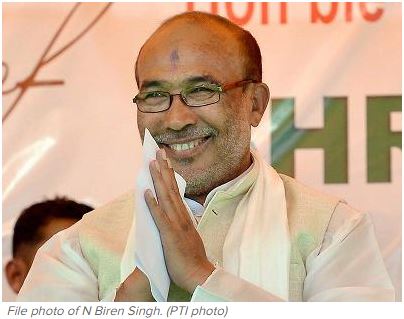By Bimol Akoijam

“Politics is the art of the possible, the attainable,” so goes a saying attributed to Otto von Bismarck. In more ways than one, N Biren Singh stands as testimony to that maxim when he was sworn in as the first BJP chief minister of Manipur on March 15.
In succeeding his mentor Okram Ibobi Singh, Biren Singh has brought a break in the uninterrupted 15-yearlong Congress regime of which he was a significant part.
He was in the Council of Ministers in the first two terms and was also spokesperson of the Congress before he left the party to join the BJP barely a few months ago. In fact, he was one of the troubleshooters of Ibobi Singh and had played a crucial role in handling numerous crises. That such a key member of the Grand Old Party would succeed the Congress government as a BJP chief minister speaks of the possibility that marks politics.
What’s more, Biren heads a government that has been made possible by cobbling up smaller parties, including the Naga People’s Front (NPF) against which the BJP had fought bitterly in the just concluded election. The political agenda of the NPF does not sit well with that of the BJP as far as the emotive “territorial integrity” of Manipur is concerned.
The NPF as a political party is committed to the idea of the integration of “contiguous Naga areas” and redrawing the existing state boundaries in the Northeast. Meanwhile, the BJP, including Prime Minister Narendra Modi, has publicly committed to protecting and preserving the existing territorial integrity of Manipur.
Biren, a footballer-turned-journalist, came on the political scene after the tumultuous events of 2001. On June 14 of that year, the
Bangkok Agreement was signed by the representatives of the Government of India and a faction of the National Socialist Council of Nagaland (NSCN, later changed to the National Socialist Council of Nagalim) led by Isak Chishi Swu and Thuingaleng Muivah. The agreement extended the “ceasefire” between the NSCN faction and the Indian security establishments “without territorial limit”. This was seen by many in Manipur as a precursor to the disintegration of the state, and consequently a violent protest erupted on June 18, 2001. The assembly was burnt down and some legislators were also attacked by protestors. In the ensuing violence, 18 people were killed in police action.
It was in the midst of that surcharged atmosphere that Biren Singh, along with some others, swore to protect Manipur’s integrity. They formed a political party called the Democratic Revolutionary People’s Party (DRPP) and fought elections in 2002. Biren was one of DRPP’s candidates who came out successful in that election to become a member of the state assembly for the first time. That the same man has become the chief minister with the support of the NPF, which stands diametrically oppossed to his political position, alludes to Bismarck’s maxim.
Source: Economic Times


